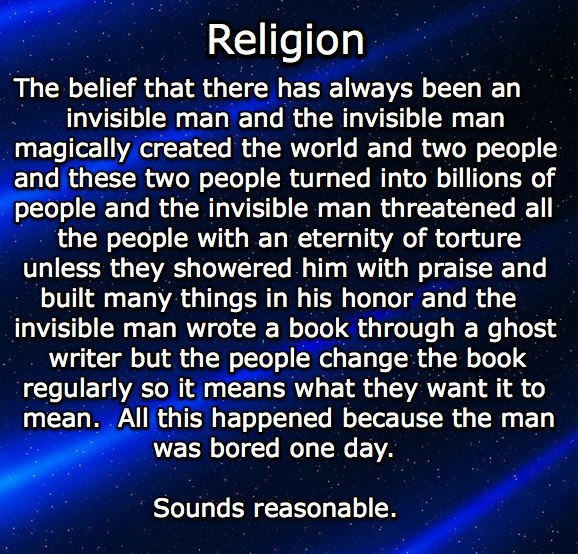I stumbled to the following image:
religionexplained.jpg (JPEG Image, 578x554 pixels)

Sometimes atheists are accused of being shrill, arrogant, blasphemous and rude when we criticize religion in terms like depicted above. That doesn't mean we're wrong, but it may turn some away from our message. However, I think it wins far more arguments and converts than it loses.
Hyperbole can be a useful tool in debates, especially when categorizing your opponent's arguments. Hyperbole has a way of simplifying the debate instantly. Once we refuse to respect conventions about blasphemy, "God" becomes a god, and then a target of ridicule.
But, it's more than that. Extreme characterization of the Christian beliefs like the one above can force Christians to examine their beliefs more closely. The reader who is shocked by the mockery implicit in the "imaginary man" reference to their god is forced to ask themselves, "in what way is that characterization wrong?" "In what ways do my beliefs differ from this idea of a capricious, malicious god?" The cumulative effect of these internal questions, even if subconsciously, can have a powerful effect, I believe. Even forcing them to ask themselves why atheists would believe this way about "God" can cause them to put themselves into our shoes and manufacture reasons for our disbelief.
This will never produce instantaneous results (other than offending the unsuspecting Christian), but I believe that it will have an effect. And always remember, "blasphemy is a victimless crime".

Wednesday, April 9, 2008
religionexplained.jpg (JPEG Image, 578x554 pixels)
Labels: atheism, brights, de-conversion, godless, humor, literalism, religion, science, society, strategy
Tuesday, April 8, 2008
GamePolitics.com � Blog Archive � Game Industry Vet: Bible Has More Adult Content than Video Games
No kidding, has anybody really read that thing?
Game Industry Vet: Bible Has More Adult Content than Video Games
A veteran video game marketing exec claims that the Bible contains more mature-themed content than most games.
Bruce Everiss, whose resume includes stints at Imagine and Codemasters, writes in his Bruce on Games blog:
Despite what some ignorant politicians and journalists might tell you, video games are fairly bland when it comes to how “adult” their content is. In fact they are usually too bland to emotionally engage and would be far better if they moved a bit in the “adult” direction…
Another reason for the blandness is the dull censoring hand of the platform holders who are amazingly prudish.
The fact is that established old media have vastly more shocking content than video games… a prime example of a book that children are encouraged to read is the Bible.
Everiss used a website known as Bible Gateway to conduct searches and found a number of themes which would be considered racy if they appeared in a video game:
The King James version has “harlot” in it 48 times, “sodomite” 5 times, “fornicator” 5 times, “smite” 133 times, “kill” 208 times and “maim” 7 times. This is shocking, you have to wonder what any right minded parent is doing exposing their children to this stuff.
Interestingly enough, University of Michigan professor Brad Bushman, a leading critic of video game violence, also found links between Biblical violence and real-life aggression in a 2007 study.
Bushman is one Jack Thompson’s expert witnesses in a pending wrongful death lawsuit against Rockstar and other video game industry defendants in Alabama.
Labels: atheism, godless, humor, literalism, society, videogames
Tuesday, April 1, 2008
Thumbs up for hands-only CPR :: CHICAGO SUN-TIMES :: Health News
Thumbs up for hands-only CPR :: CHICAGO SUN-TIMES :: Health News
However, important to note, prayer remains a non-viable alternative. If someone around you is choking, please DO NOT pray for them, please DO SOMETHING instead.In a major change aimed at getting more bystanders to do CPR, the American Heart Association now says it's OK to skip the mouth-to-mouth resuscitation when performing CPR on adults having a heart attack.
New guidelines issued by the organization Monday encourage non-medical professionals to use hands-only CPR -- doing hard, fast chest compressions -- instead of a combination of chest thrusts and rescue breathing, as long recommended.
By making CPR less complicated, the aim is to get more people to try doing it in an emergency.
"Many times, people nearby don't help because they're afraid that they will hurt the victim and aren't confident in what they're doing," said Dr. Michael Sayre, lead author of the new recommendation. "We want people to know that they can help many victims just by calling 911 and doing chest compressions. Don't be afraid to try it."
The shift is supported by evidence from three large studies done last year that found survival rates weren't hurt when mouth-to-mouth wasn't used, the heart association said.




